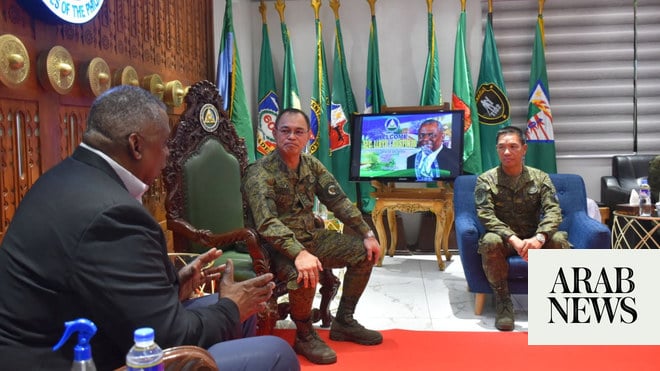
It follows a U-turn by Manila on June 3 citing COVID-19 crisis as the core reason
MANILA: US Defense Secretary Mark Esper welcomed the Philippines’ decision to suspend the termination of a vital defense pact between the two countries, reiterating his support for a strong and enduring military alliance between Washington and Manila.
It follows a phone call between Esper and his Filipino counterpart, Secretary Delfin Lorenzana, on Friday, during which he greeted the latter on Independence Day and “expressed his support for the Philippines government decision ... to suspend the Visiting Forces Agreement (VFA) termination,” said a statement released by the Pentagon.
The two also discussed a range of regional security issues, including the impact of the COVID-19 pandemic, the South China Sea, counterterrorism cooperation, and the Philippines military’s modernization plan.
The Philippines’ Defense Department (DND) confirmed the conference call between the two officials on Sunday, adding that Esper “expressed his appreciation for (Lorenzana’s) support for the Philippine government’s decision to suspend the termination of the ... VFA.”
Esper also talked about the US making “very good progress” in the development of a COVID-18 vaccine, and Washington’s willingness to share it with US allies and partners, including the Philippines, once available.
Lorenzana, for his part, took the opportunity to share the Philippines’ response to the COVID-19 pandemic and expressed appreciation for the medical assistance and donations of medical supplies provided by the US government.
Both sides reiterated their commitment to sustaining dialogue amid the pandemic and strengthening cooperation between the two defense establishments.
On Feb. 11, the Philippines government informed the US Embassy in Manila of its intent to terminate the VFA on Aug. 9, 180 days from the date of notification.
President Rodrigo Duterte, who has long been critical of the US, announced the unilateral decision after the Department of State canceled the visa for one of his political allies, Senator Ronald Dela Rosa.
On June 3, the Philippines announced it was temporarily suspending the termination of the VFA, with Foreign Affairs Secretary Teodoro Locsin Jr. saying that the pandemic and “heightened superpower tensions” had prompted the presidential U-turn.
Signed in 1998 and entering into force in 1999, the VFA governs the legal status of US military forces operating in the Philippines and establishes rules by which US troops, vessels, and aircraft may enter the country.
The VFA, and all other bilateral military agreements and activities between the US and the Philippines are supplemental to the Mutual Defense Treaty (MDT) of 1951, which serves as the foundation for the bilateral security relationship between the two countries and requires each to come to the other’s aid if attacked by a third party.
A report by the Congressional Research Service (CRS) in March noted that “while the termination of the VFA would not abrogate the MDT, it would complicate the Department of Defence’s ability to fulfill its obligations under the treaty.”
Abrogation of the VFA “raises uncertainties about the future of US-Philippine military cooperation, an essential part of the US security posture” in Asia, according to the CRS.
“The Philippines is a US treaty ally, and the termination of the VFA would not change that status... However, broad aspects of US-Philippine cooperation, including military exercises and US access to Philippine military facilities could be made difficult or impossible without the legal protection of the VFA,” the CRS report said.
Admiral Philip Davidson, head of the US Indo-Pacific Command, said in February that without the VFA, the US “ability to help the Philippines and their counter-violent extremist fight in the (Mindanao) [and] (US) ability to train and operate within the Philippines and with Filipino armed forces would be challenged.”












